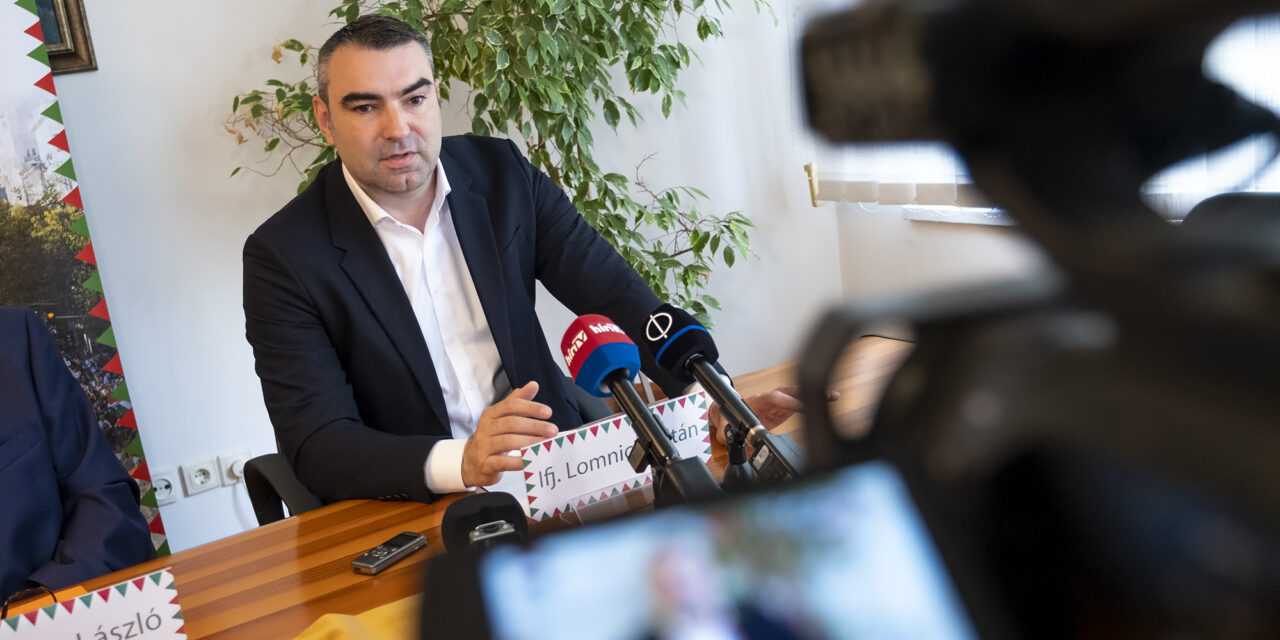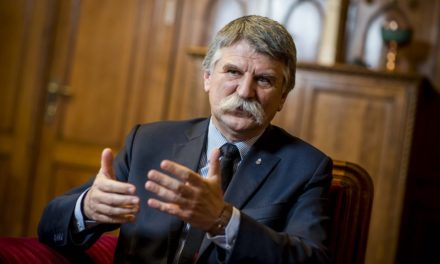An interview with Zoltán Lomnici Jr. was conducted in connection with the Prime Minister's speech in Kötcs, where, in addition to the new economic policy direction, the untrue statements of Péter Magyar, the populist expressions disparaging health care and public education were also discussed, but the left-wing provocateurs in Kötcs were also discussed.
In addition to creating the conditions for the peace budget, Viktor Orbán is also putting a lot of emphasis on his peace mission, which will be one of the main objectives of the next period, said Mr. Zoltán Lomnici Origo's question about the meeting in Kötcs. According to the scientific director of Századvég, Viktor Orbán emphasized that this budgetary stability is the basis of everything, and based on the government's plans, they will be able to do so. At the same time, the government's goal is not only to stabilize the economic situation, but to develop a comprehensive, new economic policy direction in the coming period. The expert also spoke about the fact that Péter Magyar is continuing the left-wing's long-standing habit of making lies a defining part of their politics, and they are trying to get votes with untrue statements, clichés, and disparaging health care and public education in a populist manner.
Prime Minister Viktor Orbán presented his comprehensive economic policy vision at the traditional meeting in Kotc last Saturday. In his action plan, the Prime Minister detailed Hungary's new place in the transformed world economy. Why is what Viktor Orbán Kötcsén said important, and how can this determine our country's place in the world in the coming period?
In his speech, the Prime Minister also touched on the fact that Hungary needs a new economic policy to manage the aftermath of the Covid epidemic and the global economic crisis. The corresponding action plan focuses on maintaining economic growth and increasing salaries. It has been discussed that a multipolar world order will emerge in the future and
the unipolar world order based on Western dominance may be replaced by a system with Eastern dominance, in which Hungary must adapt to the new circumstances.
One of the main lessons of the pandemic should also be clear to Western European leaders, namely that the key to global and regional stability is the ability of nations to share ideas, manage crises, create solutions and develop relationships. The Hungarian government recognized this in time, and in recent years has continued to strengthen the main directions of foreign and economic policy in the spirit of connectivity. For now, it is impossible to predict how the war in Ukraine will change the overall balance of military forces, or when the war will end. However, it seems almost certain that as long as Putin leads Russia (and not, for example, a less serious president like the former Yeltsin), the United States and the rest of NATO will engage in a new Cold War against him, which in reality may resemble the easily sharpened confrontation between the United States and China (and their strategic partners) in the Asian region.
According to Viktor Orbán, a neutral economic policy is key, the essence of which is that you should not stand behind any bloc, but open up to everyone, and always put the interests of Hungarians first. Emphasizing the importance of financial neutrality
Viktor Orbán mentioned Qatar, Tokyo and Beijing, and with regard to technological neutrality, he indicated that true energy independence can be achieved by 2032, with which the plans of NATO and the EU coincide.
The prime minister also emphasized in Kötcs that military conflicts (as our country has done so far) must be avoided, and at home there must be unity at the level of economic policy and monetary policy, and national and national economic sovereignty must be asserted at both external and internal levels.
In his plan, he explained, among other things, that wages will increase enormously On the one hand, why is this unique among the current processes in the world, and what does it indicate about the attitude of the government?
In the international arena, many countries are currently facing economic challenges such as inflation, rising food and energy prices, and the risk of a global recession. According to Bruce Kasman, Chief Economist at JP Morgan, the US and global economy are facing increasing risks of recession, which is reflected in the latest economic developments. JP Morgan has raised the probability of a recession to 35% by the end of 2024, up from 25% previously. Although the services sector remains strong, a stronger-than-expected weakening of labor demand and weaknesses in global manufacturing and the eurozone are weighing on the outlook for economic growth. Kasman emphasizes that the chance of a global recession remains unchanged at 45% until the end of 2025.
In such circumstances, many countries prefer to apply austerity, reduce budget expenditures, or consider curbing wage growth. According to the BBC, wage growth in the United States has fallen significantly recently. At the beginning of 2022, an annual wage increase of 9.3% was still measured, but this rate decreased to 3.6% by January 2024. According to ZipRecruiter's 2023 report, 48% of US companies have cut salaries in some positions. Based on data from Indeed, the increase in wages in the hospitality and retail sector was 11.8% in February 2022, while this rate fell to 3.4% by January 2024. On the other hand, the Hungarian government's goal is to significantly raise wages and increase the amount of family allowances, which goes against the austerity that has become a trend in the international arena in the recent period.
It can be seen that the leaders of Hungarian economic policy dare to take bold steps to get the country off the difficult economic and inflationary path as soon as possible. The results of this are already visible, as the purchasing power of salaries has grown in Hungary to one of the largest extents (with the fifth best result even adjusted for inflation) in the last four years among OECD member countries, while in many other states it still does not reach the level before the Covid crisis. real wage - this is revealed on the basis of the recent publication of the Organization for Economic Co-operation and Development (OECD), which now has 38 member states, which examines the labor market and is based on a comparative approach. It is also worth considering that
as an important circumstance from the point of view of the Hungarian economy, for Germany the last four years have practically passed without growth, most recently the sanctions introduced against Russia plunged Germany into an energy crisis, the rise in energy prices causing significant inflation had a serious negative effect on Europe's largest economy, as a result of which the German economy in the winter of 2022/2023 fell into recession.
Deutsche Bank analysts recently cut their (German) economic growth forecast for 2024 to just 0.2 percent. Hungarian economic policy must continue to be shaped in such a way that external negative developments have as little impact as possible. With the evaluation of all these circumstances, and amid the generally difficult economic conditions of the West-Russia and West-China confrontation, it is worth evaluating the important achievements of Hungarian economic policy in recent years.
the small business program emphasized in the plan. The prime minister explained that a budget must be drawn up that, in addition to preserving the financial balance - which is necessary because of the credit rating agencies and the entire financial world - is able to produce a 3-5 percent increase. Can it be said that the stabilization of the economic situation will be extremely important in the next period? Was this the main message formulated by the prime minister?
Based on the speech, it can be stated that the stabilization of the economic situation and the achievement of economic growth will be one of the main objectives of the next period. The goal is to push economic growth to a range of 3-5 percent by 2025, while maintaining financial balance, which is essential from the point of view of credit rating agencies and global financial markets.
Viktor Orbán emphasized that this budgetary stability is the basis for everything, and based on the government's plans, they will be able to do so. At the same time, the government's goal is not only to stabilize the economic situation, but to develop a comprehensive, new economic policy direction in the coming period.
The Prime Minister emphasized that the after-effects of the Covid-19 epidemic will remain until 2026, so adapting to the situation is essential. According to Orbán, the solution is a neutral economic policy, during which Hungary does not bind itself to any bloc, but remains open in all directions, while Hungarian interests always come first.
The Convergence Program sent by the Ministry of Finance to the European Commission predicts growth of 2.5 percent in 2024 and 4.1 percent in 2025, after which the Hungarian economy can expand by around 4 percent annually. This is based on the fact that real wages have been rising continuously since September 2023, supporting the expansion of household consumption and economic growth. With further steps to stabilize the economic situation, Hungary will be at the forefront of the EU growth ranking next year, and the demand for labor may continue to increase, so the number of employed people may continue to exceed 4.7 million people. More than one million more people work in Hungary than during the left-wing governments, and this can provide all the foundations for strengthening the financial balance and economic growth.
The prime minister also spoke about the peace budget and that he worked all summer to be able to continue his peace mission in the fall. Why is this important and what does it show about the prime minister's intentions?
The prime minister has already talked about the fact that if there was peace today, the growth of the Hungarian economy could even double, but the German economy was brought down by the war and the energy crisis; At the same time, it is very important for Hungary to continue to have access to Western markets, and the focus of the Hungarian economy will therefore remain in Europe in addition to building Eastern and African relations. In addition to creating the conditions for the peace budget, Viktor Orbán is also putting a lot of emphasis on his peace mission, which will be one of the main objectives of the next period.
The Hungarian peace mission is an important and courageous undertaking, so anything that emphasizes the role of the necessary efforts for peace, since the government has taken the firm position since the beginning of the war in Ukraine that there are no clear winners or losers, the conflict is always resolved through negotiations. first with a ceasefire, then with a long and arduous series of diplomatic negotiations. The peace mission of the Hungarian Prime Minister is so significant that it receives significant attention not only in Hungary, but also internationally. German Chancellor Olaf Scholz also supports the peace process. According to Scholz, "I believe that now is the time to discuss how to get out of this war situation and to create peace faster than it seems at the moment." Scholz added that there will definitely be another peace conference, and he thinks it is important to hold talks with Russia as well. This example also clearly shows that Viktor Orbán's peace mission is important not only for Hungary, but also for the entire international community, and that the Hungarian peace mission enjoys serious recognition on the international political scene as well.
Turning to recent strategic steps, the Prime Minister said that the airport is the repurchase of national wealth. He also said that the purchase of Vodafone is a historic step for Hungary to have a Hungarian-owned infocommunications and telecommunications company with great international power. How can we evaluate these, why are these important steps?
In the name of the public interest, the national control of strategically important companies and sectors, and the policy of this plays an important role in the global world, and the Hungarian government is also aware that this also affects the economic side of, for example, interstate and international transport and communication - which is relevant for our country determines. The airport is not just a transport hub, but a critical infrastructural element that has a significant impact on the country's economic and national security situation.
The repurchase of the airport, which was owned by a foreigner during the previous privatization, provides an opportunity for Hungary to keep this key facility in its own hands. National ownership ensures that the country can better represent its own interests and increases the ability of strategic management in the face of future economic and political challenges.
In response to a question about the state of Hungarian healthcare, Viktor Orbán said that there are currently 8,000 more doctors than in 2010. Can it be said that what the Prime Minister said refutes the claims of the campaign conducted by Péter Magyar?
The buyback not only serves to strengthen sovereignty, but also creates an opportunity to develop the airport. The goal is to increase the capacity of the terminals and significantly increase the number of passengers, which also serves future economic growth.
According to leading economists, the purchase of Vodafone Hungary opens a new chapter in the domestic telecommunications sector. The aim of this step is for Hungary to have a Hungarian-owned infocommunications and telecommunications company that has significant power not only locally, but also internationally. Through the purchase of Vodafone, the Hungarian state and 4iG will create a strong converged service provider that can compete on international markets as well. This step can contribute to the development of Hungary's digital infrastructure, increase the level of services, and increase the country's competitiveness in the global economy.
The goal of both strategic steps is to strengthen Hungary's economic independence and sovereignty, and to become a prominent actor at the international level in order to protect national interests. The acquisition of the airport and Vodafone contributes not only to the economic development of our country and increasing its competitiveness, but also to the effective representation of the country's national interests on the global stage. The areas of economic sovereignty must be subject to a clear policy in terms of investments and state-national control, because here we are talking about national interests, about our country having, if necessary, Hungarian-owned, important companies and companies that are able to meet international needs and challenges.
In response to a question about the state of Hungarian healthcare, Viktor Orbán said that there are currently 8,000 more doctors than in 2010. Can it be said that what the Prime Minister said refutes the claims of the campaign conducted by Péter Magyar?
The Basic Law XX. Article (1) para. everyone has the right to physical and mental health. Hungary promotes the enforcement of this right, among other things, by organizing health care. A prerequisite for the existence of health care is the availability of a sufficient number of well-trained medical professionals. The enforcement of this second-generation fundamental right is facilitated by the increasing number of doctors (that is, there are 8,000 more doctors now than in 2010) and the continuous rise in the standard of medical education. According to KSH data, 33,943 doctors worked in Hungary in 2010, while in 2023 this number was 42,065. In recent years, Semmelweis University has continuously improved its position on the Times Higher Education list: in 2019 it was ranked 491st, in 2020 it moved to 457th, and in 2021 to 426th, and in 2022 it was already 236th. was, while by 2023 it reached the 232nd position.
It is no wonder that there are many more doctors, since the national civilian government - treating healthcare as a priority issue and valuing healthcare workers - implemented a significant salary increase. In 2010, the starting medical salary was HUF 129,500 gross, and since 2023 it has been HUF 687,837.
The salary of Hungarian doctors is 3.8 times the average salary, which is the highest among OECD countries. Based on 2021 data, the annual income of Hungarian doctors, converted to purchasing power parity, ranks 9th among OECD countries, ahead of all V4 countries, as well as, among others, Sweden, France and Norway.
The left is regularly trying to adjust the health care situation as if it were in ruins, and only the national, civilian government in office since 2010 could do that. In fact, already in 2006, after four years in government, Ferenc Gyurcsány, the Socialist Prime Minister of our country at the time, put it this way: "Of course, the job of the health care sector is complicated, but ours is going to be easy. into an institution, he knows that it is built on a multitude of lies […] Ten of Laci's gypsy people are of such high quality. service like me."
Péter Magyar continues the left's long-established habit of making lies a defining part of their politics, and they try to get votes by making untrue statements, platitudes, and disparaging health care and public education in a populist manner. We saw the same thing during the coronavirus pandemic, when left-wing politicians and the media supporting them spread countless lies. Even before any empirical survey measuring the effectiveness of vaccines was completed, they declared that some vaccines are not good, not as effective, etc., and they also railed against vaccines and then against certain vaccines. The actors of the left hoped for political benefit from this, but the elections - the first after the coronavirus epidemic - contradicted their expectations, the Fidesz-KDNP party alliance was able to increase the number of voters and, with more than 3 million votes, won 135 mandates in the 2022 parliamentary election.
How can we evaluate the fact that the left-wing provocateurs shouted at Kötcs, and the left-wing journalists warned the left-wingers to be quiet at the Prime Minister's press conference?
The constructive attitude and the real state of the left is shown by the behavior of a small number of aggressive provocateurs. Many could perceive that provocateurs prevented not only the Prime Minister, but also the representatives of the press from being able to do their work, and this violates the principle of freedom of the press. The left-wing press, the so-called dollar media has "fallen into its own trap", because they are constantly raging against the measures of the Hungarian government, and the result of this raging is the hatred and aggression that took shape in the provocateurs' action in Kötcsé over the weekend.
Viktor Orbán: Five points about economic neutrality (with video)
Cover photo: constitutional lawyer Zoltán Lomnici Jr., spokesperson of CÖF-CÖKA / Photo: Civilek.info













